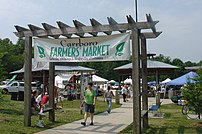 Image by lumierefl via FlickrIf you have aspirations to Make a Difference, but are hamstrung by indecision about where to start, who to support or how to put your money where your mouth is, consider starting local.
Image by lumierefl via FlickrIf you have aspirations to Make a Difference, but are hamstrung by indecision about where to start, who to support or how to put your money where your mouth is, consider starting local.Supporting your community, neighbourhood and local economy makes a huge difference, and the effects don't just stop at your backyard, by keeping your focus local you can have a global impact. See the list below to find out how living local can positively impact you, your community and the world:
- Reduce Greenhouse Gas Emissions
Goods that are locally made or grown don't have to travel so far to get from the producer to you. According to the World Watch Paper "Home Grown: The case for local food in a global market" a basic diet consisting of imported ingredients can use around four times the energy, and generate four times the greenhouse gas emissions, of an equivalent diet from local ingredients. - Keep your Money Local

A study by the Independent Business Alliance in Austin, Texas found that for every $100 spent at local businesses $45 went back to the community. By comparison, for every $100 spent at a Chain Store, only $13 stayed in the community. This money helps to create jobs, supports local producers and raises local incomes.
On a global scale, for developing nations, a focus on local production and local markets ensures that people are fed, that precious foreign exchange stays in the country, and that they are not so dependent on fickle international markets. - Reduce Waste & Pollution
Products that travel long distance need extra packaging for the journey. Food is treated with preservatives and additives so it lasts the distance. Local products don't need this extra, and locally grown food is fresher, tastier and healthier.
Industrial agriculture is chemical and energy intensive. It pollutes our land and our water ways. Greedy global corporations focused on profit exploit workers in sweatshop conditions. Local producers working for local markets are more accountable to their communities. They are not focused on constant growth, and work within a more sustainable economic model. - Encourage Crop Diversity
Industrial farms like economies of scale. Its easier and more 'efficient' to grow one variety of carrot than half a dozen. Its much easier to just grow carrots instead of carrots and potatoes and broccoli and tomatoes. Industrial farms growing for export grow food that will travel well and still look the part when it gets where its going, and that isn't necessarily the best tasting or most nutritious variety. Image via Wikipedia
Image via Wikipedia
Local farmers producing for local markets can grow what their customers want to buy. They can grow varieties of fruit or vegetables that suit local conditions, which reduces the amount of chemicals used on the crops. According to Home Grown "diverse organic and ecological farms, which rely less on purchased inputs and more on taking advantage of the ecological processes in the field, cost less to maintain and make more efficient use of land, nutrients, energy, and otherinputs, than do chemical-intensive monocultures." - Fair Made-Traded-Grown
Producing for the local market cuts out the middlemen that eat into producers income. In America studies have shown that farmers only get 20 cents of each dollar Americans spend on food. The other 80 cents is gobbled up by packaging, transportation, processing and advertising. So buying local, from local farmers, businesses, and producers means they get a fair price for their hard work - and you still get things cheaper!!


![Reblog this post [with Zemanta]](http://img.zemanta.com/reblog_e.png?x-id=b3cb750f-965b-4f27-b29e-5d298b7641ce)